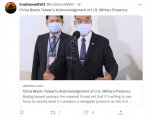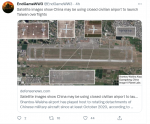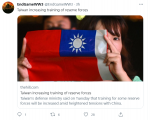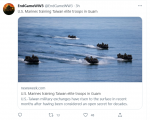You are using an out of date browser. It may not display this or other websites correctly.
You should upgrade or use an alternative browser.
You should upgrade or use an alternative browser.
WAR CHINA THREATENS TO INVADE TAIWAN
- Thread starter danielboon
- Start date
jward
passin' thru

EndGameWW3
@EndGameWW3
China warns Taiwan’s decision to confirm presence of US troops could ‘trigger war’ https://skynews.com.au/world-news/china-warns-taiwans-decision-to-confirm-presence-of-us-troops-could-trigger-war/news-story/526a1a469dddae6633d175efed97e988
via @SkyNewsAust
northern watch
TB Fanatic
northern watch
TB Fanatic
Trouble is brewing up again in the Ukraine
WAR - trouble brewing again in ukraine | Page 82 | Timebomb 2000
WAR - trouble brewing again in ukraine | Page 82 | Timebomb 2000
northern watch
TB Fanatic
danielboon
TB Fanatic
northern watch
TB Fanatic
jward
passin' thru
China could invade Taiwan ‘soon,’ says former Australian PM Abbott
By Joe Gould
Oct 29, 12:02 PM
:quality(70)/cloudfront-us-east-1.images.arcpublishing.com/mco/3XR2LZKORNDTZGHR6OE2VAOETA.jpg) Former Australian Prime Minister Tony Abbott wears a mask with the Chinese character for "Australia" during a meeting with Taiwanese President Tsai Ing-wen at the Presidential Office in Taipei, Taiwan, on Oct. 7, 2021. (AP Photo)
Former Australian Prime Minister Tony Abbott wears a mask with the Chinese character for "Australia" during a meeting with Taiwanese President Tsai Ing-wen at the Presidential Office in Taipei, Taiwan, on Oct. 7, 2021. (AP Photo)
WASHINGTON ― A former Australian prime minister said Friday he thinks China could “soon” invade Taiwan or otherwise escalate the situation and that the West should now be planning its military and economic response.
“I think we need to be prepared to think the unthinkable,” former Prime Minister Tony Abbott said at a Wilson Center event here.
“I think it’s highly possible that at some point in time, perhaps quite soon, China might up the ante, either with a blockade of the so-called rebel province ― to teach the Taiwanese that they ... need to make some kind of an accommodation with Beijing ― or perhaps even a full-scale invasion,” he added.
Abbott earlier this month made geopolitical waves when he accused China of being a bully and expressed enthusiastic support for Taiwan while visiting the democratically ruled island.
China, which claims Taiwan as its own territory, has stepped up military harassment of the island by flying fighter jets toward Taiwan ― a trend Abbott said he expects to “get more intense.”
Abbott sees Chinese leader Xi Jinping as emboldened by the West’s mild reaction to China’s takeover of Hong Kong. Unlike Hong Kong, Taiwan would offer military resistance, but it would still need outside backing, he said.
“In the absence of support from others, the Taiwanese might regard it as an unequal and ultimately hopeless struggle. And that’s why I think it’s important for Taiwan’s fellow democracies to provide all the solidarity that we can,” Abbott said.
RELATED
:quality(70)/cloudfront-us-east-1.images.arcpublishing.com/mco/FR3QNRVPGZED5LHO3OVB574EOA.jpg)
US troops on Taiwan, confirms island nation’s president, confident America would defend it
Tsai didn’t tell CNN exactly how many US military personnel are on the island at present but said it was “not as many as people thought.
By Huizhong Wu
U.S. President Joe Biden set off alarm bells in Beijing early this month by saying the U.S. has a firm commitment to help Taiwan defend itself in the event of a Chinese attack. Though the White House later played down the remarks, Abbott said he was “encouraged” by Biden’s comments and that there’s more broadly been a “rhetorical escalation” from the West.
Abbott’s appearance came weeks after the unveiling of a U.S.-British deal to supply nuclear-powered submarines to Australia, which supplanted a prior French deal to supply Australia with its own submarines.
On Friday, Abbott reiterated his calls for Australia to take over one or more retiring U.S. Los Angeles-class or U.K. Trafalgar-class submarines soon because the new nuclear-powered subs won’t arrive for years. The nuclear-powered submarines he’s proposing for the interim would augment the Collins-class submarines in Australia’s inventory, he said.
“We need better, bigger, faster more wide-ranging submarines not in two decades time but now,” he said, adding that “the challenges are pressing, the peril is not far off.”
Both the U.K. and France have dispatched carrier groups to the region, and the Royal Navy’s Astute submarine was on a port call to Perth on Friday. Abbott said he hopes the U.K. will send more naval assets and use Singapore’s facilities, as the U.S. Navy does.
“I think it’s very important for Britain and France, which have long had a Pacific presence, to increase that Pacific presence, given that east Asia is probably now the most strategically important part of the world,” he said.
Abbott also called for enhanced intelligence sharing with Japan, saying it could be a “powerful addition” to the Five Eyes intelligence arrangement.
U.S. military officials have called China the “pacing challenge.” On Thursday, Vice Chairman of the Joint Chiefs of Staff, Gen. John Hyten said the rate at which China’s military is developing capabilities is “stunning,” while U.S. development suffers from “brutal” bureaucracy.
In spite of a Biden administration defense budget that prioritizes technology development, Abbott said “the gap is likely to get wider, not smaller in the years to come.
“Is the U.S. increasing its capabilities at the same rate as China is? I think the short answer is no,” he said.
:quality(70)/cloudfront-us-east-1.images.arcpublishing.com/archetype/3XR2LZKORNDTZGHR6OE2VAOETA.jpg)
 www.defensenews.com
www.defensenews.com
By Joe Gould
Oct 29, 12:02 PM
:quality(70)/cloudfront-us-east-1.images.arcpublishing.com/mco/3XR2LZKORNDTZGHR6OE2VAOETA.jpg)
WASHINGTON ― A former Australian prime minister said Friday he thinks China could “soon” invade Taiwan or otherwise escalate the situation and that the West should now be planning its military and economic response.
“I think we need to be prepared to think the unthinkable,” former Prime Minister Tony Abbott said at a Wilson Center event here.
“I think it’s highly possible that at some point in time, perhaps quite soon, China might up the ante, either with a blockade of the so-called rebel province ― to teach the Taiwanese that they ... need to make some kind of an accommodation with Beijing ― or perhaps even a full-scale invasion,” he added.
Abbott earlier this month made geopolitical waves when he accused China of being a bully and expressed enthusiastic support for Taiwan while visiting the democratically ruled island.
China, which claims Taiwan as its own territory, has stepped up military harassment of the island by flying fighter jets toward Taiwan ― a trend Abbott said he expects to “get more intense.”
Abbott sees Chinese leader Xi Jinping as emboldened by the West’s mild reaction to China’s takeover of Hong Kong. Unlike Hong Kong, Taiwan would offer military resistance, but it would still need outside backing, he said.
“In the absence of support from others, the Taiwanese might regard it as an unequal and ultimately hopeless struggle. And that’s why I think it’s important for Taiwan’s fellow democracies to provide all the solidarity that we can,” Abbott said.
RELATED
:quality(70)/cloudfront-us-east-1.images.arcpublishing.com/mco/FR3QNRVPGZED5LHO3OVB574EOA.jpg)
US troops on Taiwan, confirms island nation’s president, confident America would defend it
Tsai didn’t tell CNN exactly how many US military personnel are on the island at present but said it was “not as many as people thought.
By Huizhong Wu
U.S. President Joe Biden set off alarm bells in Beijing early this month by saying the U.S. has a firm commitment to help Taiwan defend itself in the event of a Chinese attack. Though the White House later played down the remarks, Abbott said he was “encouraged” by Biden’s comments and that there’s more broadly been a “rhetorical escalation” from the West.
Abbott’s appearance came weeks after the unveiling of a U.S.-British deal to supply nuclear-powered submarines to Australia, which supplanted a prior French deal to supply Australia with its own submarines.
On Friday, Abbott reiterated his calls for Australia to take over one or more retiring U.S. Los Angeles-class or U.K. Trafalgar-class submarines soon because the new nuclear-powered subs won’t arrive for years. The nuclear-powered submarines he’s proposing for the interim would augment the Collins-class submarines in Australia’s inventory, he said.
“We need better, bigger, faster more wide-ranging submarines not in two decades time but now,” he said, adding that “the challenges are pressing, the peril is not far off.”
Both the U.K. and France have dispatched carrier groups to the region, and the Royal Navy’s Astute submarine was on a port call to Perth on Friday. Abbott said he hopes the U.K. will send more naval assets and use Singapore’s facilities, as the U.S. Navy does.
“I think it’s very important for Britain and France, which have long had a Pacific presence, to increase that Pacific presence, given that east Asia is probably now the most strategically important part of the world,” he said.
Abbott also called for enhanced intelligence sharing with Japan, saying it could be a “powerful addition” to the Five Eyes intelligence arrangement.
U.S. military officials have called China the “pacing challenge.” On Thursday, Vice Chairman of the Joint Chiefs of Staff, Gen. John Hyten said the rate at which China’s military is developing capabilities is “stunning,” while U.S. development suffers from “brutal” bureaucracy.
In spite of a Biden administration defense budget that prioritizes technology development, Abbott said “the gap is likely to get wider, not smaller in the years to come.
“Is the U.S. increasing its capabilities at the same rate as China is? I think the short answer is no,” he said.
:quality(70)/cloudfront-us-east-1.images.arcpublishing.com/archetype/3XR2LZKORNDTZGHR6OE2VAOETA.jpg)
China could invade Taiwan ‘soon,’ says former Australian PM Abbott
A former Australian prime minister said Friday he thinks China could “soon” invade Taiwan or otherwise escalate and that the West should now be planning its military and economic response.
jward
passin' thru
China Minister Says Taiwan’s Only Prospect Is Unification
Bloomberg News
October 30, 2021, 12:33 AM CDT

Wang Yi Photographer: Angelos Tzortzinis/AFP/Getty Images
Taiwan has no future prospect other than unification with China, Chinese Foreign Minister Wang Yi said in Rome at the G-20 summit.
Wang was responding to questions on efforts by countries including the United States to support Taiwan’s greater participation in the United Nations and in the international community, according to a statement posted on China’s foreign ministry website Saturday. Chinese officials slammed the U.S. earlier in the week and warned its support for Taiwan could pose “huge risks” to relations between Beijing and Washington.
“The history and legal facts of ‘One China’ are unchallengeable and the progress for China’s 1.4 billion population to promote the peaceful reunification of the motherland is unstoppable,” said Wang. Under international law, Taiwan has no status other than being a part of China, he said.
Countries that “willfully” pushed their overtures on the Taiwan issue would pay the price, Wang said, according to the statement.
— With assistance by Amanda Wang, and Charlie Zhu
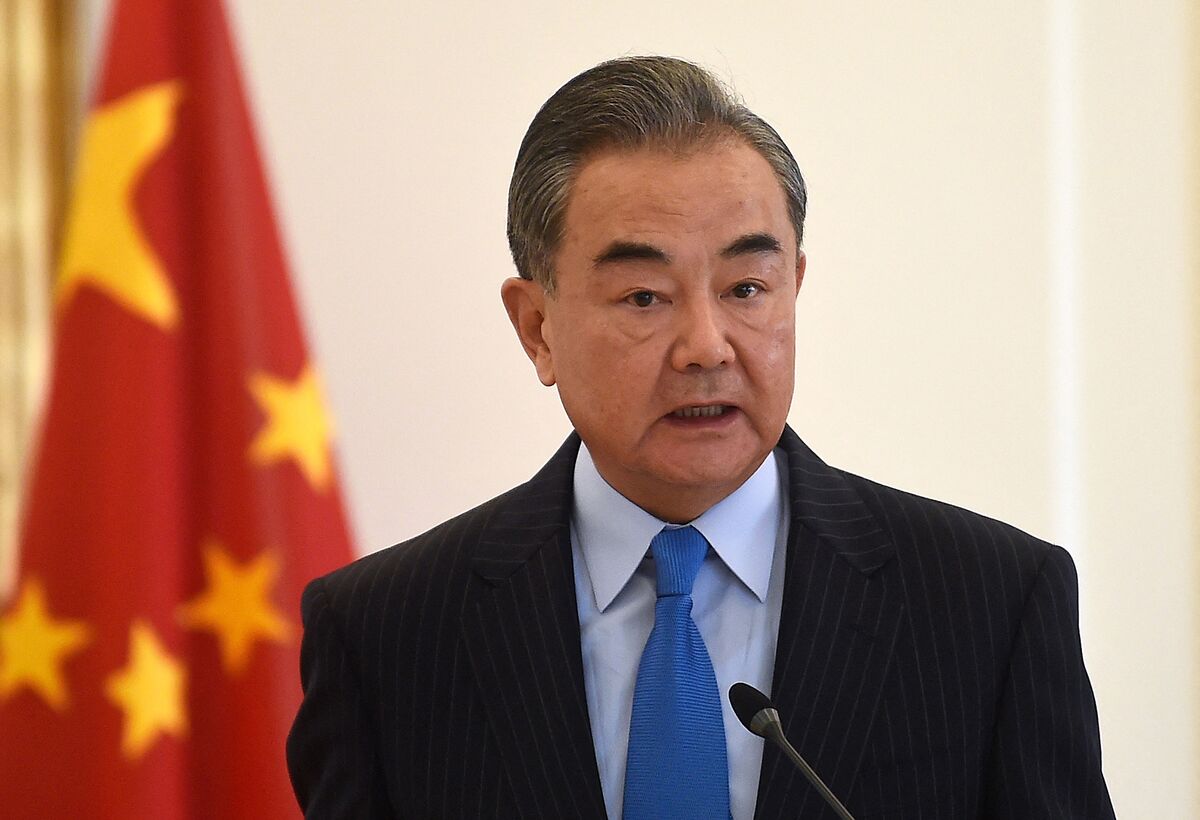
 www.bloomberg.com
www.bloomberg.com
Bloomberg News
October 30, 2021, 12:33 AM CDT
- History, legal facts of One-China ‘unchallengeable’: Wang Yi
- Foreign minister Wang speaks at G-20 meeting in Rome

Wang Yi Photographer: Angelos Tzortzinis/AFP/Getty Images
Taiwan has no future prospect other than unification with China, Chinese Foreign Minister Wang Yi said in Rome at the G-20 summit.
Wang was responding to questions on efforts by countries including the United States to support Taiwan’s greater participation in the United Nations and in the international community, according to a statement posted on China’s foreign ministry website Saturday. Chinese officials slammed the U.S. earlier in the week and warned its support for Taiwan could pose “huge risks” to relations between Beijing and Washington.
| Related stories: |
|---|
| China Slams U.S. Support of Taiwan, Saying It Has No Place in UN |
| China Warns U.S. That Support for Taiwan Poses ‘Huge Risks’ (1) |
Countries that “willfully” pushed their overtures on the Taiwan issue would pay the price, Wang said, according to the statement.
— With assistance by Amanda Wang, and Charlie Zhu

China Minister Says Taiwan’s Only Prospect Is Unification
Taiwan has no future prospect other than unification with China, Chinese Foreign Minister Wang Yi said in Rome at the G-20 summit.
jward
passin' thru
Blinken clashes with China over US support for Taiwan
Beijing warns against interference, as US secretary of state also urges China to meet climate responsibilities
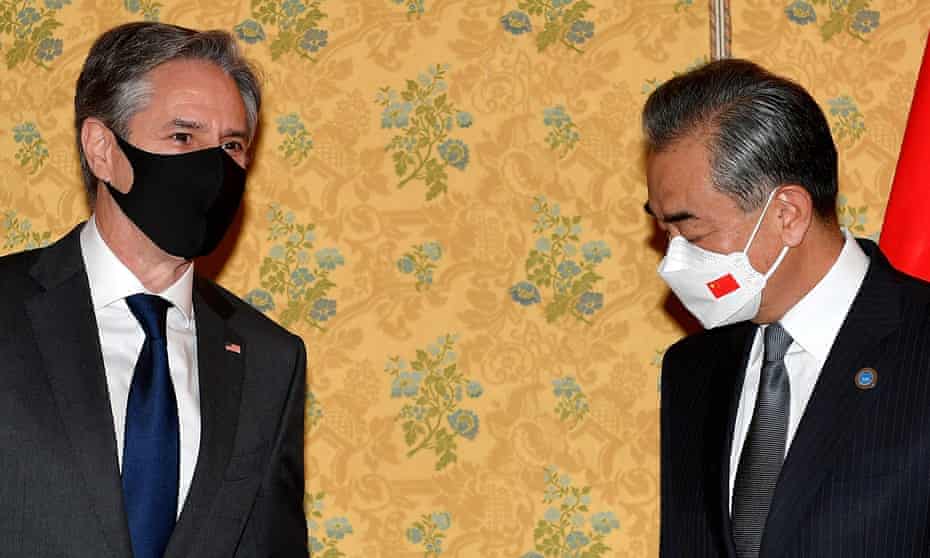
Antony Blinken (left) meets his Chinese counterpart, Wang Yi, on the sidelines of the G20 summit in Rome. Photograph: Reuters
Patrick Wintour in Rome
Sun 31 Oct 2021 11.32 EDT
Last modified on Sun 31 Oct 2021 11.34 EDT
The US secretary of state has clashed with his Chinese opposite number, saying the US will provide Taiwan with the means to defend itself as China warned it must end its interference on the island.
Antony Blinken also urged China to live up to its responsibilities on the climate emergency, pointing out it was the largest carbon emitter.
The hour-long meeting on the sidelines of the G20 summit in Rome was described by US officials as “exceptionally candid” but productive, and would help lay the groundwork for a virtual summit between the US president, Joe Biden, and the Chinese leader, Xi Jinping, later this year.
Blinken’s promise to help Taiwan’s defence came a week after Biden said the US may support Taiwan’s independence militarily and Blinken called for Taiwan to be recognised within UN institutions.
The White House subsequently denied Biden had intended to breach the longstanding policy of neutrality on Taiwan’s status.
The country of 20 million people sees itself as being on the frontline of the war between democracy and authoritarianism, Taiwan’s foreign minister, Joseph Wu, told a meeting on the fringes of the G20 on Saturday dedicated to highlighting China’s human rights abuses.
Taiwan’s defence department said eight Chinese planes entered its air defence zone on Sunday, the latest in a growing number of incursions designed to assert China’s claim to the island.
Q&AWhy is China increasing its military pressure on Taiwan?
Show
The meeting between Wang Yi and Blinken is the first since a stormy confrontation in Alaska in March, during which the Chinese delegation berated the US side in front of the TV cameras. The state department said Blinken made it “crystal clear” that Washington opposed any unilateral changes by Beijing to the status quo in Taiwan.
Blinken characterised the meeting as an attempt to responsibly manage the competition between the two countries, highlighting the topics where the countries can cooperate and those where they are fated to compete. He said it was longstanding US policy to help Taiwan prepare its defences.
Wang told Blinken that tensions over Taiwan were caused by US support for pro-independence forces on the island. China has said Biden’s remarks – almost overturning the policy of strategic ambiguity – sent an irresponsible signal as they seriously violate the one-China principle.
The Chinese foreign ministry said earlier this week: “For quite some time, the US has been making negative moves by selling arms to Taiwan and strengthening official and military ties with Taiwan, including the launch of a $750m arms sale plan to Taiwan, the landing of US military aircraft in Taiwan and frequent sailing of US warships across the Taiwan strait.”
The Taiwanese president, Tsai Ing-wen, confirmed the presence of a small number of American soldiers who had come to train her army and said she was “trusting” the US to defend her island against China.
Blinken and Wang did not discuss a recent Chinese hypersonic weapons test that military experts say appears to show Beijing’s pursuit of an Earth-orbiting system designed to evade American missile defences, the official said.
Speaking to CNN’s State of the Union, Blinken questioned China’s climate commitments: “It’s ultimately going to be up to China, as now currently the world’s largest emitter, to decide whether it is going to do the right and important thing for its own people. Unless we’re all in this together in … taking the steps necessary to keep warming to 1.5C, then it’s going to be a problem.”
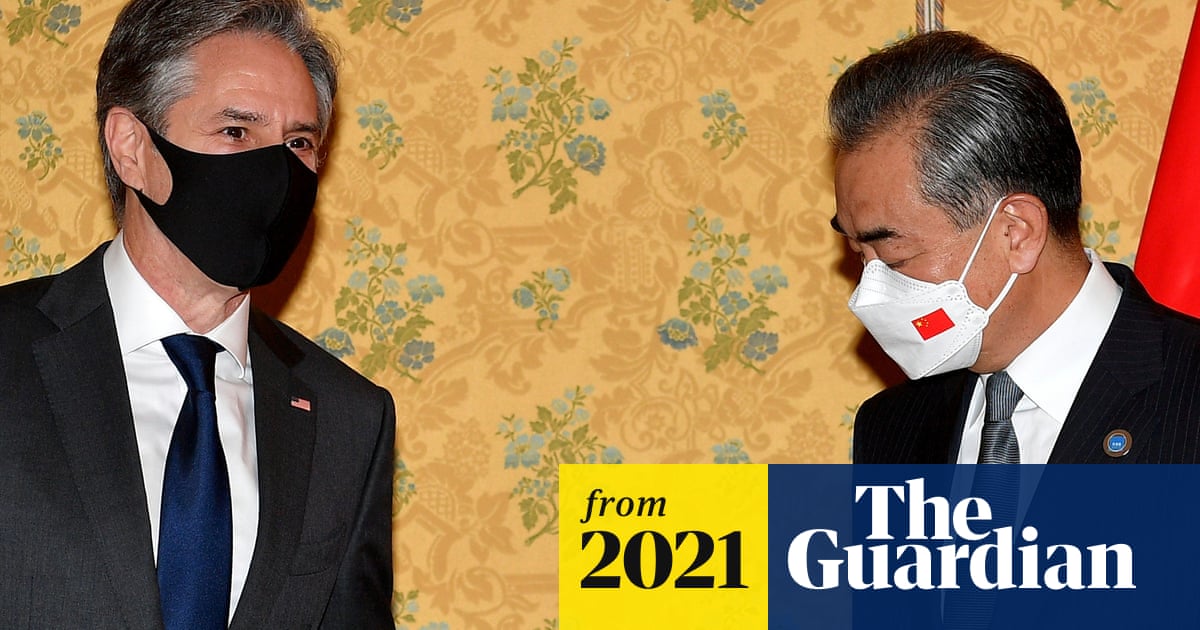
 www.theguardian.com
www.theguardian.com
Beijing warns against interference, as US secretary of state also urges China to meet climate responsibilities

Antony Blinken (left) meets his Chinese counterpart, Wang Yi, on the sidelines of the G20 summit in Rome. Photograph: Reuters
Patrick Wintour in Rome
Sun 31 Oct 2021 11.32 EDT
Last modified on Sun 31 Oct 2021 11.34 EDT
The US secretary of state has clashed with his Chinese opposite number, saying the US will provide Taiwan with the means to defend itself as China warned it must end its interference on the island.
Antony Blinken also urged China to live up to its responsibilities on the climate emergency, pointing out it was the largest carbon emitter.
The hour-long meeting on the sidelines of the G20 summit in Rome was described by US officials as “exceptionally candid” but productive, and would help lay the groundwork for a virtual summit between the US president, Joe Biden, and the Chinese leader, Xi Jinping, later this year.
Blinken’s promise to help Taiwan’s defence came a week after Biden said the US may support Taiwan’s independence militarily and Blinken called for Taiwan to be recognised within UN institutions.
The White House subsequently denied Biden had intended to breach the longstanding policy of neutrality on Taiwan’s status.
The country of 20 million people sees itself as being on the frontline of the war between democracy and authoritarianism, Taiwan’s foreign minister, Joseph Wu, told a meeting on the fringes of the G20 on Saturday dedicated to highlighting China’s human rights abuses.
Taiwan’s defence department said eight Chinese planes entered its air defence zone on Sunday, the latest in a growing number of incursions designed to assert China’s claim to the island.
Q&AWhy is China increasing its military pressure on Taiwan?
Show
The meeting between Wang Yi and Blinken is the first since a stormy confrontation in Alaska in March, during which the Chinese delegation berated the US side in front of the TV cameras. The state department said Blinken made it “crystal clear” that Washington opposed any unilateral changes by Beijing to the status quo in Taiwan.
Blinken characterised the meeting as an attempt to responsibly manage the competition between the two countries, highlighting the topics where the countries can cooperate and those where they are fated to compete. He said it was longstanding US policy to help Taiwan prepare its defences.
Wang told Blinken that tensions over Taiwan were caused by US support for pro-independence forces on the island. China has said Biden’s remarks – almost overturning the policy of strategic ambiguity – sent an irresponsible signal as they seriously violate the one-China principle.
The Chinese foreign ministry said earlier this week: “For quite some time, the US has been making negative moves by selling arms to Taiwan and strengthening official and military ties with Taiwan, including the launch of a $750m arms sale plan to Taiwan, the landing of US military aircraft in Taiwan and frequent sailing of US warships across the Taiwan strait.”
The Taiwanese president, Tsai Ing-wen, confirmed the presence of a small number of American soldiers who had come to train her army and said she was “trusting” the US to defend her island against China.
Blinken and Wang did not discuss a recent Chinese hypersonic weapons test that military experts say appears to show Beijing’s pursuit of an Earth-orbiting system designed to evade American missile defences, the official said.
Speaking to CNN’s State of the Union, Blinken questioned China’s climate commitments: “It’s ultimately going to be up to China, as now currently the world’s largest emitter, to decide whether it is going to do the right and important thing for its own people. Unless we’re all in this together in … taking the steps necessary to keep warming to 1.5C, then it’s going to be a problem.”

Blinken clashes with China over US support for Taiwan
Beijing warns against interference, as US secretary of state also urges China to meet climate responsibilities
jward
passin' thru
China warns Lithuania, European officials over Taiwan row

Chinese Foreign Ministry spokesman Wang Wenbin speaks during a news conference in Beijing
Sat, October 30, 2021, 4:21 AM·1 min read
SHANGHAI (Reuters) - China on Saturday warned Lithuania and European officials not to disrupt ties over decisions by Taiwan and the Baltic country to open reciprocal representative offices.
China demanded in August that Lithuania withdraw its ambassador in Beijing and said it would recall China's envoy to Vilnius after Taiwan announced that its office in Vilnius would be called the Taiwanese Representative Office in Lithuania.
Other Taiwan offices in Europe and the United States use the name of the city Taipei, avoiding a reference to the island itself, which China claims as its own territory.
Lithuania said earlier this year it planned to open a representative office in Taiwan, a decision that also angered Beijing.
China "resolutely opposes" official contacts between countries that have diplomatic relations with China and authorities in Taiwan, Wang Wenbin, a foreign ministry spokesman said in a statement on its website.
"We urge the Lithuanian government to abide by the solemn political commitments made when establishing diplomatic relations with China and not to make irreversible wrong decisions," Wang said.
"The European side should adopt a correct position and prevent interference with the healthy development of China-EU relations."
China's Xinhua official news agency said Wang's comments followed a joint letter from the presidents of the European Council and the European Commission expressing concern over China's criticisms of the representative offices.
(Reporting by Andrew Galbraith; Editng by Robert Birsel)

 news.yahoo.com
news.yahoo.com

Chinese Foreign Ministry spokesman Wang Wenbin speaks during a news conference in Beijing
Sat, October 30, 2021, 4:21 AM·1 min read
SHANGHAI (Reuters) - China on Saturday warned Lithuania and European officials not to disrupt ties over decisions by Taiwan and the Baltic country to open reciprocal representative offices.
China demanded in August that Lithuania withdraw its ambassador in Beijing and said it would recall China's envoy to Vilnius after Taiwan announced that its office in Vilnius would be called the Taiwanese Representative Office in Lithuania.
Other Taiwan offices in Europe and the United States use the name of the city Taipei, avoiding a reference to the island itself, which China claims as its own territory.
Lithuania said earlier this year it planned to open a representative office in Taiwan, a decision that also angered Beijing.
China "resolutely opposes" official contacts between countries that have diplomatic relations with China and authorities in Taiwan, Wang Wenbin, a foreign ministry spokesman said in a statement on its website.
"We urge the Lithuanian government to abide by the solemn political commitments made when establishing diplomatic relations with China and not to make irreversible wrong decisions," Wang said.
"The European side should adopt a correct position and prevent interference with the healthy development of China-EU relations."
China's Xinhua official news agency said Wang's comments followed a joint letter from the presidents of the European Council and the European Commission expressing concern over China's criticisms of the representative offices.
(Reporting by Andrew Galbraith; Editng by Robert Birsel)

China warns Lithuania, European officials over Taiwan row
China on Saturday warned Lithuania and European officials not to disrupt ties over decisions by Taiwan and the Baltic country to open reciprocal representative offices. China demanded in August that Lithuania withdraw its ambassador in Beijing and said it would recall China's envoy to Vilnius...
jward
passin' thru
China warns US on Taiwan question in Rome amid tensions
Global Times
7-8 minutes
China warns US on Taiwan question in Rome amid tensions
Subversive damage to ties includes a war between
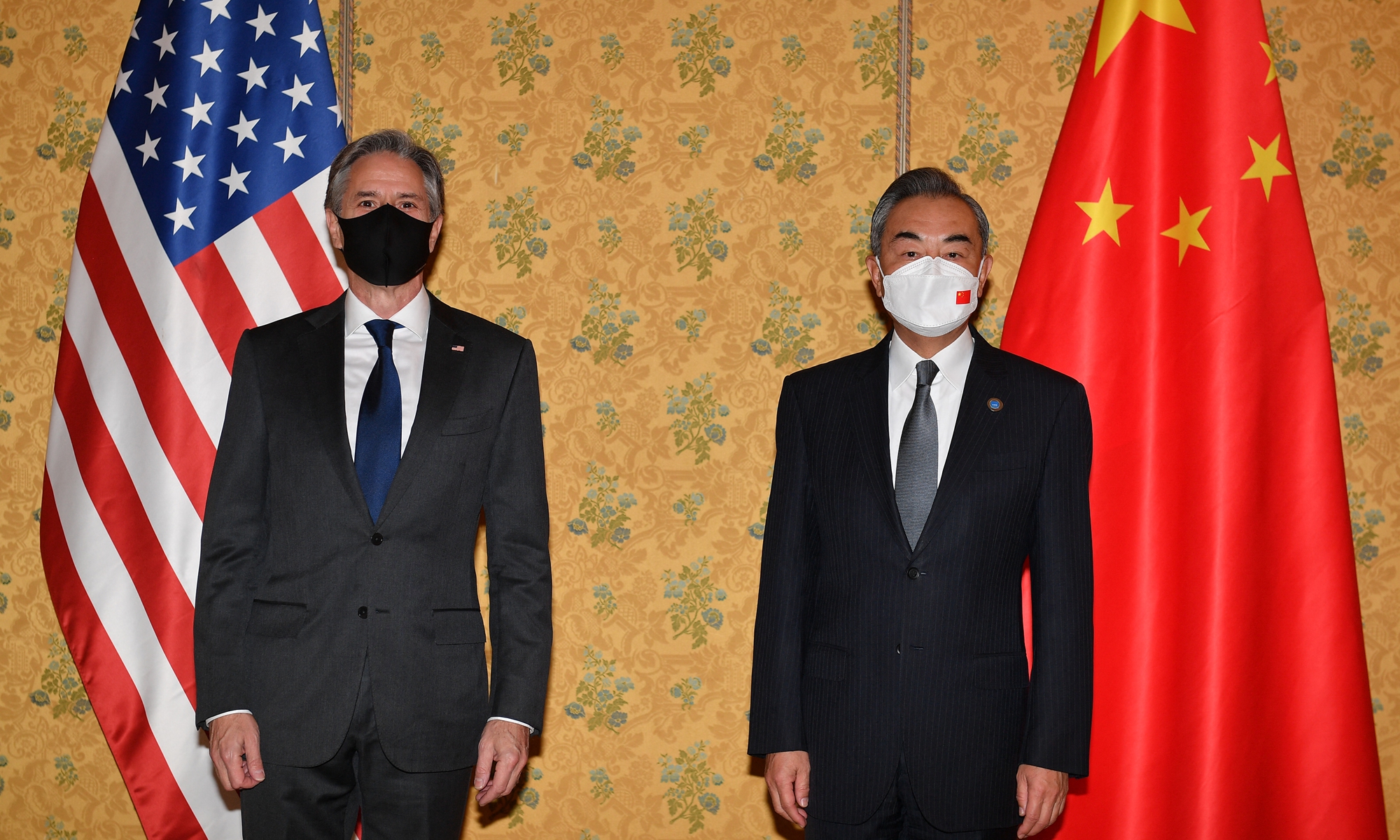
Chinese State Councilor and Foreign Minister Wang Yi (right) and US Secretary of State Antony Blinken pose for photo prior to their meeting on October 31, 2021 at a hotel in Rome on the sidelines of the G20 of World Leaders Summit of Rome. Photo: AFP
Chinese State Councilor and Foreign Minister Wang Yi met US Secretary of State Antony Blinken on Sunday on the sidelines of the G20 leaders summit in Rome, Italy, the first face-to-face meeting between the top diplomats of the two countries after Blinken made a provocative statement challenging China's sovereignty on the Taiwan question, saying the US will support the island's secessionist authorities "robust" participation in the UN system.
According to the videos released by Yuyuan Tantian, a social media account affiliated with China's state broadcaster CCTV, Blinken and US delegates arrived at the residence of the Chinese delegation, entering via a side door. The meeting lasted for about 50 minutes. Wang and Blinken took photos together after the courtesy greetings, but did not shake hands or have a COVID-safe elbow bump, media reported.
Chinese analysts said these details show the atmosphere of the meeting was as tense as China-US relations, and although it will not ease the situation, keeping communication open will at least help the two sides avoid conflicts and manage their differences. On the US' constant provocations on the Taiwan question, Washington should take note of the gravity of the situation if China decides to retaliate, since the US has already provided excuses for China to activate the Anti-secessionism Law, experts suggest.
According to the website of the Chinese Foreign Ministry, Wang pointed out at the meeting that the US has repeatedly claimed it is China's changing status quo that caused recent tensions in the Taiwan Straits, which is totally untrue and a serious misrepresentation to the international community.
"The Taiwan question is the most sensitive matter between China and the US, and if the question is mishandled, it would bring subversive damage to overall China-US ties," Wang said, stressing that the real status quo of the Taiwan question is that there is only one China, and Taiwan is a part of China, and the mainland and Taiwan belong to one and the same country.
History has proved that any attempt to change the status quo will bring serious damage to stability in the Taiwan Straits, and even create a Taiwan Straits crisis.
Lü Xiang, an expert on US studies and a research fellow at the Chinese Academy of Social Sciences, told the Global Times that "the subversive damage to overall China-US ties" mentioned by Wang include "a war between the two countries" or other catastrophic consequences.
The crux of the current situation in the Taiwan Straits is that Taiwan secessionist authorities have repeatedly attempted to break the framework of the one-China principle, and the US is to blame for its connivance and support of secessionist forces, Wang Yi said.
Wang demanded that the US side commit to a genuine one-China policy, not a fake one, that the US fulfill its commitments to China, and that the US truly implements the one-China policy, instead of saying one thing but doing another.
In contrast to the March meeting between the top diplomats of the two countries in Alaska, when the Biden administration had not yet fully defined its China policy, the meeting in Rome focused on very specific issues, particularly the Taiwan question, Xin Qiang, deputy director of the Center for American Studies at Fudan University, told the Global Times on Sunday.
"The main purpose of the meeting for the Chinese delegation was to warn the US to be careful in its words and actions on Taiwan question, otherwise the China-US relationship and cross-Straits relations would be seriously damaged."
The reason China wants to stress the Taiwan question, an internal affair, with the US in this meeting is that it hopes the US understands its current approach is seriously shaking China-US relations, Diao Daming, an associate professor at the Renmin University of China in Beijing, told the Global Times on Sunday.
Blinken has reaffirmed that "the US will keep insistence on the one-China policy," according to the website of Chinese foreign ministry.
Lü said the US is unlikely to stop its provocative moves on the Taiwan question, and in the future, military tensions in the Taiwan Straits could escalate further. Since China has already pointed out the US duplicity on the Taiwan question, it is likely the People's Liberation Army (PLA) will send military aircraft to fly over the island. "This is a pressure test for the US 'one-China policy,' as this way we can see what consequences the US would like to face to keep its duplicity," Lü said.
Recently, the leader of the Taiwan secessionist authority openly confirmed a US military presence on the island. "If the Chinese mainland wants to solve the Taiwan question once and for all, the case is a perfect pretext to activate the Anti-secession Law," Xin noted. "The US should note how serious the consequences would be if they keep supporting the secessionist authority on the island diplomatically and militarily."
Hard to cooperate
Wang told Blinken at the meeting that "I am willing to build regular contact with you, to have frank and timely exchanges of views… to avoid miscalculation and explore cooperation."
Blinken said the US agrees that the two countries should develop bilateral ties based on the spirit of mutual respect, and be willing to keep communication with the Chinese side, to responsibly manage differences and avoid confrontation and crisis.
Wang also expressed China's serious concerns over the problems caused by US acts that damaged China's rightful interests, and demanded the US to correct mistakes to bring China-US ties back on track. Both sides also discussed issues including climate change, energy supply, the Iran nuclear deal, the Korean Peninsula situation, Myanmar and Afghanistan, and agreed to continue dialogues on dealing with global challenges.
Lü said if the US fails to correct its mistakes and keeps being provocative on sensitive matters like the Taiwan question, there is no chance for the US to get any cooperation or assistance from China.
"As long as the US stops provoking, China-US relations will be able to return to a reasonable track. Under such a framework, China and the US can explore more normal international relations issues, such as the G20, economic cooperation and environmental management," said Diao.

Global Times
7-8 minutes
China warns US on Taiwan question in Rome amid tensions
Subversive damage to ties includes a war between

Chinese State Councilor and Foreign Minister Wang Yi (right) and US Secretary of State Antony Blinken pose for photo prior to their meeting on October 31, 2021 at a hotel in Rome on the sidelines of the G20 of World Leaders Summit of Rome. Photo: AFP
Chinese State Councilor and Foreign Minister Wang Yi met US Secretary of State Antony Blinken on Sunday on the sidelines of the G20 leaders summit in Rome, Italy, the first face-to-face meeting between the top diplomats of the two countries after Blinken made a provocative statement challenging China's sovereignty on the Taiwan question, saying the US will support the island's secessionist authorities "robust" participation in the UN system.
According to the videos released by Yuyuan Tantian, a social media account affiliated with China's state broadcaster CCTV, Blinken and US delegates arrived at the residence of the Chinese delegation, entering via a side door. The meeting lasted for about 50 minutes. Wang and Blinken took photos together after the courtesy greetings, but did not shake hands or have a COVID-safe elbow bump, media reported.
Chinese analysts said these details show the atmosphere of the meeting was as tense as China-US relations, and although it will not ease the situation, keeping communication open will at least help the two sides avoid conflicts and manage their differences. On the US' constant provocations on the Taiwan question, Washington should take note of the gravity of the situation if China decides to retaliate, since the US has already provided excuses for China to activate the Anti-secessionism Law, experts suggest.
According to the website of the Chinese Foreign Ministry, Wang pointed out at the meeting that the US has repeatedly claimed it is China's changing status quo that caused recent tensions in the Taiwan Straits, which is totally untrue and a serious misrepresentation to the international community.
"The Taiwan question is the most sensitive matter between China and the US, and if the question is mishandled, it would bring subversive damage to overall China-US ties," Wang said, stressing that the real status quo of the Taiwan question is that there is only one China, and Taiwan is a part of China, and the mainland and Taiwan belong to one and the same country.
History has proved that any attempt to change the status quo will bring serious damage to stability in the Taiwan Straits, and even create a Taiwan Straits crisis.
Lü Xiang, an expert on US studies and a research fellow at the Chinese Academy of Social Sciences, told the Global Times that "the subversive damage to overall China-US ties" mentioned by Wang include "a war between the two countries" or other catastrophic consequences.
The crux of the current situation in the Taiwan Straits is that Taiwan secessionist authorities have repeatedly attempted to break the framework of the one-China principle, and the US is to blame for its connivance and support of secessionist forces, Wang Yi said.
Wang demanded that the US side commit to a genuine one-China policy, not a fake one, that the US fulfill its commitments to China, and that the US truly implements the one-China policy, instead of saying one thing but doing another.
In contrast to the March meeting between the top diplomats of the two countries in Alaska, when the Biden administration had not yet fully defined its China policy, the meeting in Rome focused on very specific issues, particularly the Taiwan question, Xin Qiang, deputy director of the Center for American Studies at Fudan University, told the Global Times on Sunday.
"The main purpose of the meeting for the Chinese delegation was to warn the US to be careful in its words and actions on Taiwan question, otherwise the China-US relationship and cross-Straits relations would be seriously damaged."
The reason China wants to stress the Taiwan question, an internal affair, with the US in this meeting is that it hopes the US understands its current approach is seriously shaking China-US relations, Diao Daming, an associate professor at the Renmin University of China in Beijing, told the Global Times on Sunday.
Blinken has reaffirmed that "the US will keep insistence on the one-China policy," according to the website of Chinese foreign ministry.
Lü said the US is unlikely to stop its provocative moves on the Taiwan question, and in the future, military tensions in the Taiwan Straits could escalate further. Since China has already pointed out the US duplicity on the Taiwan question, it is likely the People's Liberation Army (PLA) will send military aircraft to fly over the island. "This is a pressure test for the US 'one-China policy,' as this way we can see what consequences the US would like to face to keep its duplicity," Lü said.
Recently, the leader of the Taiwan secessionist authority openly confirmed a US military presence on the island. "If the Chinese mainland wants to solve the Taiwan question once and for all, the case is a perfect pretext to activate the Anti-secession Law," Xin noted. "The US should note how serious the consequences would be if they keep supporting the secessionist authority on the island diplomatically and militarily."
Hard to cooperate
Wang told Blinken at the meeting that "I am willing to build regular contact with you, to have frank and timely exchanges of views… to avoid miscalculation and explore cooperation."
Blinken said the US agrees that the two countries should develop bilateral ties based on the spirit of mutual respect, and be willing to keep communication with the Chinese side, to responsibly manage differences and avoid confrontation and crisis.
Wang also expressed China's serious concerns over the problems caused by US acts that damaged China's rightful interests, and demanded the US to correct mistakes to bring China-US ties back on track. Both sides also discussed issues including climate change, energy supply, the Iran nuclear deal, the Korean Peninsula situation, Myanmar and Afghanistan, and agreed to continue dialogues on dealing with global challenges.
Lü said if the US fails to correct its mistakes and keeps being provocative on sensitive matters like the Taiwan question, there is no chance for the US to get any cooperation or assistance from China.
"As long as the US stops provoking, China-US relations will be able to return to a reasonable track. Under such a framework, China and the US can explore more normal international relations issues, such as the G20, economic cooperation and environmental management," said Diao.

China warns US on Taiwan question in Rome amid tensions - Global Times
www.globaltimes.cn
Bolerpuller
Contributing Member
Taiwan should apply to be a US protectorate.
northern watch
TB Fanatic
northern watch
TB Fanatic
jward
passin' thru
US military presence in Taiwan an ‘open secret’ for decades

Minnie Chan
+ FOLLOW
Published: 6:17pm, 1 Nov, 2021
Updated: 10:14pm, 1 Nov, 2021
Why you can trust SCMP
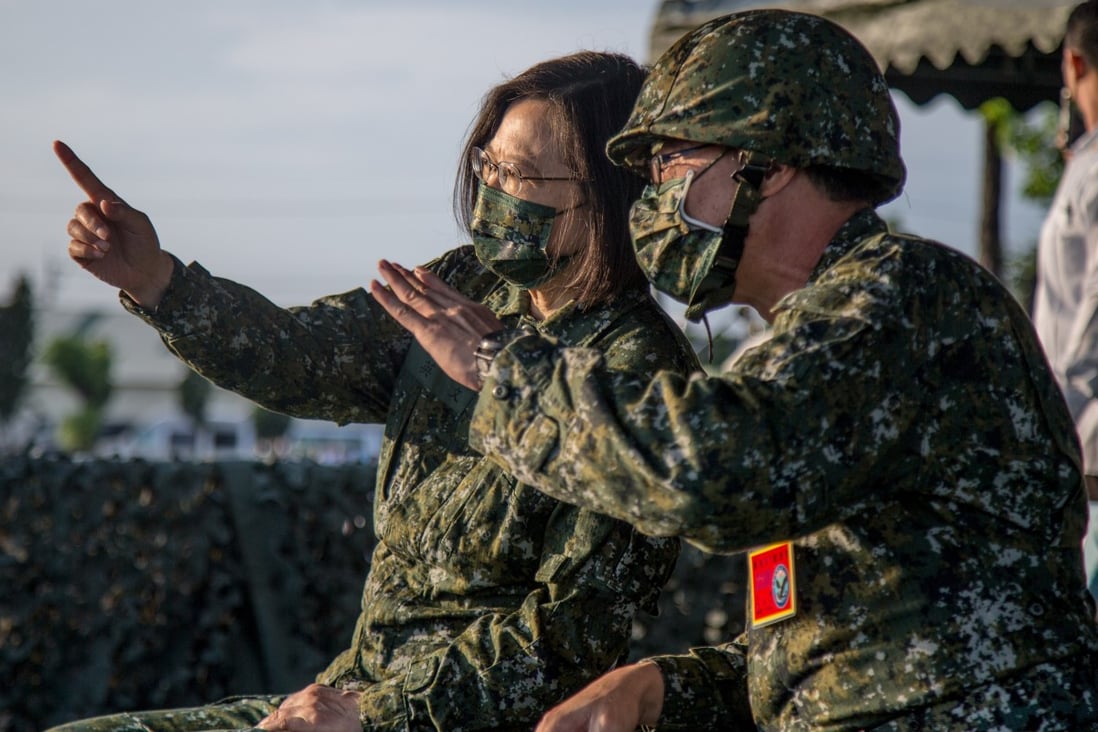
Taiwanese President Tsai Ing-wen’s confirmation that US military personnel were on the island ended 40 years a tacit understanding between Beijing and Washington, analysts said. Photo: EPA-EFE
Washington and Beijing had a “tacit mutual understanding” over the past four decades about the presence of US troops in Taiwan, but the understanding that it would remain low-key was broken with the public confirmation by Taiwanese President Tsai Ing-wen, according to military analysts.
Beijing was aware that the United States had deployed some military personnel to Taiwan as liaison officers since 1980 – in the aftermath of 1979’s end to diplomatic ties between Washington and Taipei – for unofficial defence exchanges, a Beijing-based military source said.
Beijing accuses US of ‘sabotaging’ Taiwan Strait peace
30 Oct 2021

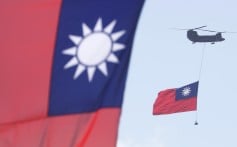
“The mainland realised that the US has kept about one dozen low-ranking military officers under the official title of ‘advisers’ in Taiwan after the 1980s,” said the source, who requested anonymity because of the issue’s sensitivity.
“The group of US military officers is operating like a liaison team to take care of defence operations between Washington and Taipei, such as helping with training, which is supposed to be a strategic tacit mutual understanding between Washington and Beijing.”
Washington switched diplomatic recognition from Taipei to Beijing in 1979, but the US retains cultural, commercial and other unofficial relations with the self-ruled island under three joint communiques signed by Beijing and Washington in the 1970s and early 1980s.
Under the Taiwan Relations Act, the US is committed to providing the island with security and self-defence support, which includes selling arms to Taipei, despite Beijing’s opposition.
According to the source, Beijing was also aware of another group of US marines stationed on the island to maintain security of the American Institute in Taiwan (AIT), Washington’s de facto embassy, but they were not incumbent US military officers.
Asked about US defence of Taiwan, Blinken repeats commitment to weapons sales
1 Nov 2021

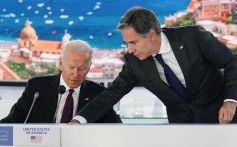
Professor Lin Chong-Pin, a former Taiwanese deputy defence minister, said the deployment of US marines to AIT, as well as their military engagements with Taiwanese officers, had been open secrets for decades.
“It’s not a big deal at all. Sometimes the US would send military personnel to help train Taiwan’s military, that could be part of their post-sale service for arms sales, or sometimes just pure training assistance,” Lin said. “There was a consensus that none of the American officers would wear uniforms in Taiwan.”
While the deployments were not made public, Beijing made little protest. But that changed with Tsai’s public confirmation of the arrangement last week, pushing Beijing to make a tougher response and warn the US against giving the “wrong signal” to Taiwan pro-independence groups.
Tensions between Beijing and Washington over Taiwan were already running high, following support from US diplomats – including Secretary of State Antony Blinken – for Taiwanese participation in international organisations.
China insists Taiwan has no right to join United Nations
Drew Thompson, a former US Defence Department official who managed relations with mainland China, Taiwan and Mongolia, said US arms sales would include training and support, not just hardware. “Recent revelations in the media that it is occurring do not indicate any change in the status quo. The only new development in this issue is Beijing’s politically-motivated outrage.”
The mainland military source said the breaking of more than 40 years of tacit assumption was a “politically-motivated attempt to provoke the mainland authorities’ bottom line”.
“Making the strategic tacit mutual understanding a public acknowledgement was aimed at turning such a consensus to a political issue,” the source said. “The move has further complicated the relationship between the US and China, Beijing and Taipei, as well as Washington and Taiwan.”
On Monday, the Taipei-based United Daily News reported that the US is expected to deploy a new “special operation cooperation team” to the island, led by an army major and lieutenant colonel, for training assistance. It said the deployment would become a regular US military-assisted training establishment stationed in Taiwan.
The report said the team could not be called “a troop” because it would not help with the island’s military defence. The deployment was pushed by Taiwan army commander General Hsu Yen-pu’s visit to Washington last month for the Association of the US Army’s annual meeting, it said.
On Friday, the new AIT head Sandra Oudkirk told Taiwanese reporters that ties between Washington and Taipei were “rock solid”, and highlighted that such relationships “are grounded in a commitment” in accordance with the Taiwan Relations Act.
This article appeared in the South China Morning Post print edition as: Presence of US troops an ‘open secret’
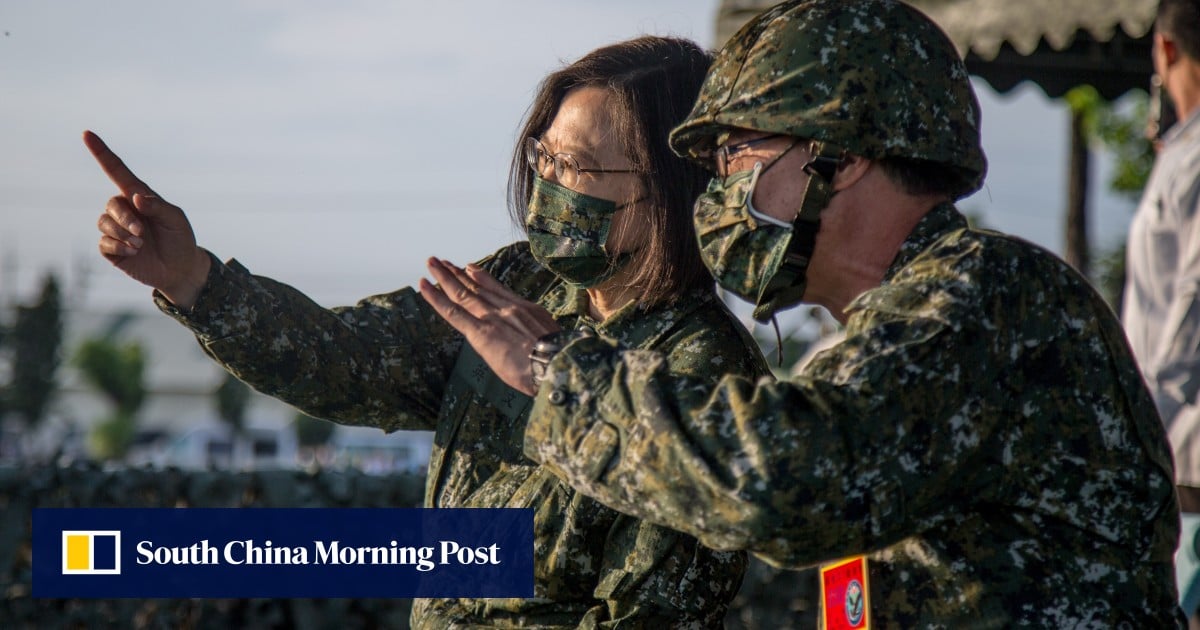
 www.scmp.com
www.scmp.com
- Last week’s revelation by Tsai Ing-wen broke 40 years of a ‘tacit mutual understanding’ between Beijing and Washington
- US military personnel have been deployed to the island as ‘advisers’ since diplomatic ties with Taipei ended in 1979, analysts said

Minnie Chan
+ FOLLOW
Published: 6:17pm, 1 Nov, 2021
Updated: 10:14pm, 1 Nov, 2021
Why you can trust SCMP

Taiwanese President Tsai Ing-wen’s confirmation that US military personnel were on the island ended 40 years a tacit understanding between Beijing and Washington, analysts said. Photo: EPA-EFE
Washington and Beijing had a “tacit mutual understanding” over the past four decades about the presence of US troops in Taiwan, but the understanding that it would remain low-key was broken with the public confirmation by Taiwanese President Tsai Ing-wen, according to military analysts.
Beijing was aware that the United States had deployed some military personnel to Taiwan as liaison officers since 1980 – in the aftermath of 1979’s end to diplomatic ties between Washington and Taipei – for unofficial defence exchanges, a Beijing-based military source said.
Beijing accuses US of ‘sabotaging’ Taiwan Strait peace
30 Oct 2021

“The mainland realised that the US has kept about one dozen low-ranking military officers under the official title of ‘advisers’ in Taiwan after the 1980s,” said the source, who requested anonymity because of the issue’s sensitivity.
“The group of US military officers is operating like a liaison team to take care of defence operations between Washington and Taipei, such as helping with training, which is supposed to be a strategic tacit mutual understanding between Washington and Beijing.”
Washington switched diplomatic recognition from Taipei to Beijing in 1979, but the US retains cultural, commercial and other unofficial relations with the self-ruled island under three joint communiques signed by Beijing and Washington in the 1970s and early 1980s.
Under the Taiwan Relations Act, the US is committed to providing the island with security and self-defence support, which includes selling arms to Taipei, despite Beijing’s opposition.
According to the source, Beijing was also aware of another group of US marines stationed on the island to maintain security of the American Institute in Taiwan (AIT), Washington’s de facto embassy, but they were not incumbent US military officers.
Asked about US defence of Taiwan, Blinken repeats commitment to weapons sales
1 Nov 2021

Professor Lin Chong-Pin, a former Taiwanese deputy defence minister, said the deployment of US marines to AIT, as well as their military engagements with Taiwanese officers, had been open secrets for decades.
“It’s not a big deal at all. Sometimes the US would send military personnel to help train Taiwan’s military, that could be part of their post-sale service for arms sales, or sometimes just pure training assistance,” Lin said. “There was a consensus that none of the American officers would wear uniforms in Taiwan.”
While the deployments were not made public, Beijing made little protest. But that changed with Tsai’s public confirmation of the arrangement last week, pushing Beijing to make a tougher response and warn the US against giving the “wrong signal” to Taiwan pro-independence groups.
Tensions between Beijing and Washington over Taiwan were already running high, following support from US diplomats – including Secretary of State Antony Blinken – for Taiwanese participation in international organisations.
China insists Taiwan has no right to join United Nations
Drew Thompson, a former US Defence Department official who managed relations with mainland China, Taiwan and Mongolia, said US arms sales would include training and support, not just hardware. “Recent revelations in the media that it is occurring do not indicate any change in the status quo. The only new development in this issue is Beijing’s politically-motivated outrage.”
The mainland military source said the breaking of more than 40 years of tacit assumption was a “politically-motivated attempt to provoke the mainland authorities’ bottom line”.
“Making the strategic tacit mutual understanding a public acknowledgement was aimed at turning such a consensus to a political issue,” the source said. “The move has further complicated the relationship between the US and China, Beijing and Taipei, as well as Washington and Taiwan.”
On Monday, the Taipei-based United Daily News reported that the US is expected to deploy a new “special operation cooperation team” to the island, led by an army major and lieutenant colonel, for training assistance. It said the deployment would become a regular US military-assisted training establishment stationed in Taiwan.
The report said the team could not be called “a troop” because it would not help with the island’s military defence. The deployment was pushed by Taiwan army commander General Hsu Yen-pu’s visit to Washington last month for the Association of the US Army’s annual meeting, it said.
On Friday, the new AIT head Sandra Oudkirk told Taiwanese reporters that ties between Washington and Taipei were “rock solid”, and highlighted that such relationships “are grounded in a commitment” in accordance with the Taiwan Relations Act.
This article appeared in the South China Morning Post print edition as: Presence of US troops an ‘open secret’

Beijing has ‘known for decades’ that US has military in Taiwan
Last week’s revelation by Tsai Ing-wen broke 40 years of a ‘tacit mutual understanding’ between Beijing and Washington.
jward
passin' thru
Letter to Editor: Taiwan's urgent need for nuclear weapons
1828
By Matthew Clayton, Taiwan News, Contributing Writer
2021/11/02 17:11

A Taiwanese flag flaps in the wind in Taoyuan, Taiwan, June 30, 2021. (Reuters photo)
It has become clear over the past few months that Taiwan's sovereignty is in danger.
China has been emboldened by the world's failure to punish it for its deceit and complicity in the spread of the COVID-19 virus and also by the American capitulation in Afghanistan.
The addition of “Xi Jinping Thought” to the Chinese Communist Party (CCP) Constitution in 2017 made Xi Jinping (習近平) the most powerful Chinese leader since Mao.
The honor shows the days of political domination in China by one man are with us again. Xi looks set to be an influential force in Chinese politics far into the future.
Chairman Xi has presided over a rapid cooling of relations with Taiwan. This, combined with the political strength of President Tsai Ing-wen's (蔡英文) party in Taiwan is ominous, even if President Tsai does not declare independence.
China no longer stresses peaceful relations in the region as it did when it was militarily inferior. As China's capability increases, its rhetoric and posture become ever more bellicose.
This, together with its continual and spurious claim that Taiwan belongs to it, serves as a warning of China's end strategy. The question is not if an invasion will happen but when.
The recent AUKUS pact between the United States, Australia, and the United Kingdom suggests the West is now realizing the threat China poses not only to Taiwan but to the region. Similar to the 1930s concerning Hitler's rise in Europe, however, it will prove too late.
As early as 2017, China's plethora of defensive weapons had the potential to render an American response to a Chinese invasion of Taiwan a failure, and Chinese capabilities have only increased since then, reducing the human and political cost of attacking Taiwan. Even worse is the Biden administration's alarming political ambivalence on defending Taiwanese sovereignty.
In tandem with a slump in the polls, this could prompt China to attack Taiwan before the next American presidential election, where former President Trump looks set to run again.
It is not a coincidence that China's posture has been much more aggressive since President Trump left office. The infiltration by the Chinese into the critical infrastructure of other Western powers, such as nuclear power stations and internet networks in the U.K., also serves to make a multilateral Western counter-attack unlikely.
Japan has constitutional restrictions on using its military to attack rather than defend. All of these factors show that Taiwan cannot rely on outside help to be saved in the event of an attack.
A radical departure from current deterrence strategy is needed to save Taiwan. The only credible deterrence that will safeguard Taiwan's sovereignty is an independent nuclear strike capability.
At this stage, it is natural to ask: why would this make a difference if American nuclear weapons do not deter a Chinese invasion? This can be explained by a very simple calculation: because unlike the U.S., Taiwan would be fighting for its very survival as a nation.
Take the example of Israel. Invaded twice by its neighbors, no wise person seriously entertains the notion of a third invasion since it was furnished with an independent nuclear deterrent with the help of the U.S. and multiple European nations.
Taiwan is both outnumbered and outgunned by the Chinese military and will only fall further behind. Nuclear weapons are the only alternative to guarantee Taiwan's sovereignty.
If Taiwan's allies are serious about laying down a marker to deter Chinese aggression in the future, it is time to do for Taiwan what was done for Israel. In the case of Japan, lending assistance in this endeavor would serve as a useful way to demonstrate its well-known capability to “go nuclear” without actually going through the constitutional and political risks of in fact doing so.
Taiwan is not the only Pacific dispute involving the Chinese. The window for Taiwan's allies to help it establish credible deterrence in the region becomes narrower every day and by the end of Biden's administration could prove too late.
Anything less than providing nuclear weapons to Taiwan amounts to appeasement of China and will prove to be a mistake of historic and catastrophic proportions.
 www.taiwannews.com.tw
www.taiwannews.com.tw
1828
By Matthew Clayton, Taiwan News, Contributing Writer
2021/11/02 17:11

A Taiwanese flag flaps in the wind in Taoyuan, Taiwan, June 30, 2021. (Reuters photo)
It has become clear over the past few months that Taiwan's sovereignty is in danger.
China has been emboldened by the world's failure to punish it for its deceit and complicity in the spread of the COVID-19 virus and also by the American capitulation in Afghanistan.
The addition of “Xi Jinping Thought” to the Chinese Communist Party (CCP) Constitution in 2017 made Xi Jinping (習近平) the most powerful Chinese leader since Mao.
The honor shows the days of political domination in China by one man are with us again. Xi looks set to be an influential force in Chinese politics far into the future.
Chairman Xi has presided over a rapid cooling of relations with Taiwan. This, combined with the political strength of President Tsai Ing-wen's (蔡英文) party in Taiwan is ominous, even if President Tsai does not declare independence.
China no longer stresses peaceful relations in the region as it did when it was militarily inferior. As China's capability increases, its rhetoric and posture become ever more bellicose.
This, together with its continual and spurious claim that Taiwan belongs to it, serves as a warning of China's end strategy. The question is not if an invasion will happen but when.
The recent AUKUS pact between the United States, Australia, and the United Kingdom suggests the West is now realizing the threat China poses not only to Taiwan but to the region. Similar to the 1930s concerning Hitler's rise in Europe, however, it will prove too late.
As early as 2017, China's plethora of defensive weapons had the potential to render an American response to a Chinese invasion of Taiwan a failure, and Chinese capabilities have only increased since then, reducing the human and political cost of attacking Taiwan. Even worse is the Biden administration's alarming political ambivalence on defending Taiwanese sovereignty.
In tandem with a slump in the polls, this could prompt China to attack Taiwan before the next American presidential election, where former President Trump looks set to run again.
It is not a coincidence that China's posture has been much more aggressive since President Trump left office. The infiltration by the Chinese into the critical infrastructure of other Western powers, such as nuclear power stations and internet networks in the U.K., also serves to make a multilateral Western counter-attack unlikely.
Japan has constitutional restrictions on using its military to attack rather than defend. All of these factors show that Taiwan cannot rely on outside help to be saved in the event of an attack.
A radical departure from current deterrence strategy is needed to save Taiwan. The only credible deterrence that will safeguard Taiwan's sovereignty is an independent nuclear strike capability.
At this stage, it is natural to ask: why would this make a difference if American nuclear weapons do not deter a Chinese invasion? This can be explained by a very simple calculation: because unlike the U.S., Taiwan would be fighting for its very survival as a nation.
Take the example of Israel. Invaded twice by its neighbors, no wise person seriously entertains the notion of a third invasion since it was furnished with an independent nuclear deterrent with the help of the U.S. and multiple European nations.
Taiwan is both outnumbered and outgunned by the Chinese military and will only fall further behind. Nuclear weapons are the only alternative to guarantee Taiwan's sovereignty.
If Taiwan's allies are serious about laying down a marker to deter Chinese aggression in the future, it is time to do for Taiwan what was done for Israel. In the case of Japan, lending assistance in this endeavor would serve as a useful way to demonstrate its well-known capability to “go nuclear” without actually going through the constitutional and political risks of in fact doing so.
Taiwan is not the only Pacific dispute involving the Chinese. The window for Taiwan's allies to help it establish credible deterrence in the region becomes narrower every day and by the end of Biden's administration could prove too late.
Anything less than providing nuclear weapons to Taiwan amounts to appeasement of China and will prove to be a mistake of historic and catastrophic proportions.
Taiwan News - Breaking News, Politics, Environment, Immigrants, Travel, and Health
Taiwan News is the most widely visited English-language portal for news about Taiwan, offering the outside world a revealing look at all things Taiwan
danielboon
TB Fanatic
EndGameWW3
@EndGameWW3
·
30m
Update: Representatives of the Chinese government warned current and former Canadian officials at a recent meeting that Ottawa should not send any more military vessels through the Taiwan Strait, saying it is a provocative move that threatens peace. (The Globe and Mail)
@EndGameWW3
·
30m
Update: Representatives of the Chinese government warned current and former Canadian officials at a recent meeting that Ottawa should not send any more military vessels through the Taiwan Strait, saying it is a provocative move that threatens peace. (The Globe and Mail)
jward
passin' thru
..uhoh.. his assurances do the opposite of reassuring me.
https://pbs.twimg.com/profile_images/898153945721339904/O****PfR_bigger.jpg
Disclose.tv
@disclosetv
11m
NEW - General Mark Milley assesses it unlikely that China will attempt to retake Taiwan within the next 6, 12, or 24 months.
View: https://twitter.com/disclosetv/status/1455900558775177223?s=20
https://pbs.twimg.com/profile_images/898153945721339904/O****PfR_bigger.jpg
Disclose.tv
@disclosetv
11m
NEW - General Mark Milley assesses it unlikely that China will attempt to retake Taiwan within the next 6, 12, or 24 months.
View: https://twitter.com/disclosetv/status/1455900558775177223?s=20
..uhoh.. his assurances do the opposite of reassuring me.

Disclose.tv
@disclosetv
11m
NEW - General Mark Milley assesses it unlikely that China will attempt to retake Taiwan within the next 6, 12, or 24 months.
View: https://twitter.com/disclosetv/status/1455900558775177223?s=20
Ahahahahahahahah what an absolute tool. You know what that tells me? Less than 6 months.
Zactly. My first comment was so that means days, maybe a week. I'm really starting to believe we might see a major pop off somewhere before the champagne corks this NYE
Yep. When the military deception ramps up I get tense. In all honesty, I'm preparing for sometime this month. Ill be grateful to make to to Thanksgiving. If they hold off till New Year even better. But it is close. It is so palpable you can almost taste it.
Grumphau
Veteran Member
Given his friendly relationship with PLA generals, I think he is likely basing his estimate on misinformation they are feeding him...uhoh.. his assurances do the opposite of reassuring me.

Disclose.tv
@disclosetv
11m
NEW - General Mark Milley assesses it unlikely that China will attempt to retake Taiwan within the next 6, 12, or 24 months.
View: https://twitter.com/disclosetv/status/1455900558775177223?s=20
jward
passin' thru
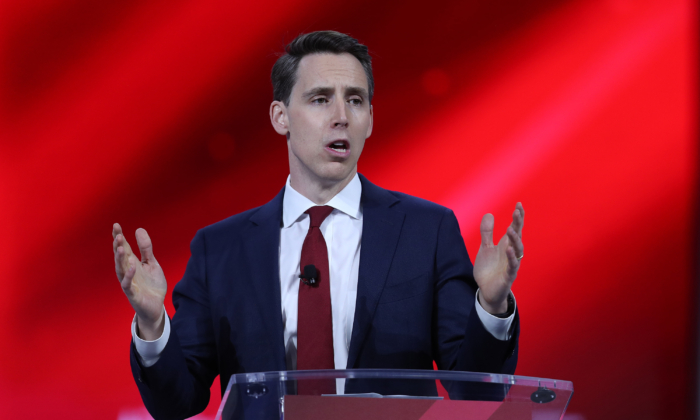
Sen. Josh Hawley (R-Mo.) addresses the Conservative Political Action Conference (CPAC) held in the Hyatt Regency in Orlando, Fla., on Feb. 26, 2021. (Joe Raedle/Getty Images)
Asia & Pacific
Sen. Hawley Introduces Bill to Help Taiwan Arm Itself Against Potential China Invasion
By Isabel van Brugen
November 3, 2021 Updated: November 3, 2021
Sen. Josh Hawley (R-Mo.) on Tuesday introduced legislation that seeks to bolster Taiwan’s ability to defend itself in the event that the self-ruled island were attacked by China.
“Taiwan is in grave danger, but the future is not yet written,” wrote Hawley in a press release introducing the Arm Taiwan Act of 2021.
The bill (pdf), Hawley said, would strengthen Taiwan’s defenses against a Chinese invasion by allocating $3 billion annually for a new Taiwan Security Assistance Initiative to ramp up the island’s deployment of asymmetric defense capabilities.
It would task the secretary of defense to form the security initiative and authorize $3 billion annually for it for fiscal years 2023 to 2027.
The funds would specifically accelerate Taiwan’s deployment of “asymmetric capabilities necessary to delay, degrade and negate a Chinese invasion” against the island, the legislation states.
The Republican senator cited warnings from U.S. and Taiwanese officials that “China may try to invade Taiwan in over the next few years.”
“We must do everything in our power to help Taiwan urgently strengthen its defenses. If China’s recent actions have shown anything to the world, it’s that Beijing will stop at nothing in its quest to dominate the Indo–Pacific and then the world,” Hawley said in a statement. “We must not let them succeed.”
The Chinese Communist Party (CCP) claims that the self-ruled island of Taiwan is a province of China. The democratically governed island has its own constitution, military, and ruling party.
Beijing has escalated military harassment against the island in recent weeks, including through a show of force from the Chinese military over Taiwan’s air defense zone.
Chinese leader Xi Jinping in early October vowed to achieve “reunification of the nation” in a speech, calling the island’s independence a “serious hidden danger to national rejuvenation.”
The United States currently maintains a decades-long foreign policy known as “strategic ambiguity,” meaning that it is deliberately vague on the question of whether it would come to Taiwan’s defense.
However, Washington is required by law—the Taiwan Relations Act (TRA)—to provide the island with military equipment for its self-defense.
Taiwan President Tsai Ing-wen, who previously said the island will do “whatever it takes” to safeguard it against mounting CCP aggression, confirmed last week that for the first time in four decades there are U.S. troops on Taiwanese soil.
Tsai also said that she’s confident that the United States would defend the self-ruled island if it were attacked by China.
“I do have faith, given the long-term relationship that we have with the United States. and also the support of the people of the United States as well as the Congress,” she told CNN in an interview aired on Oct. 27. “The administration has been very helpful.”
President Joe Biden and Xi are expected to hold a virtual meeting before the end of the year, according to White House national security adviser Jake Sullivan.
Frank Fang contributed to this report.

Sen. Hawley Introduces Bill to Help Taiwan Arm Itself Against Potential China Invasion
danielboon
TB Fanatic
CHINA SAYS US BRINGING US CLOSER
TO NUCLEAR WAR View: https://mobile.twitter.com/EndGameWW3/status/1456326186003415040
View: https://mobile.twitter.com/EndGameWW3/status/1456326186003415040
TO NUCLEAR WAR
 View: https://mobile.twitter.com/EndGameWW3/status/1456326186003415040
View: https://mobile.twitter.com/EndGameWW3/status/1456326186003415040Doomer Doug
TB Fanatic
..uhoh.. his assurances do the opposite of reassuring me.

Disclose.tv
@disclosetv
11m
NEW - General Mark Milley assesses it unlikely that China will attempt to retake Taiwan within the next 6, 12, or 24 months.
View: https://twitter.com/disclosetv/status/1455900558775177223?s=20

What a stupid F=_*>( this traitor is. They may go in by Thanksgiving to sync with their korean war revisionist epic.
Grumphau
Veteran Member
Yes by not backing down to the CCP's provocations against our allies.CHINA SAYS US BRINGING US CLOSER
TO NUCLEAR WARView: https://mobile.twitter.com/EndGameWW3/status/1456326186003415040
jward
passin' thru
We may have till THANKSGIVING? At this point, even that lil bit of time would be a personal godsend.

Indo-Pacific News - Watching the CCP-China Threat
@IndoPac_Info
18m
'How to buy house in Taiwan Province after unification' trending in China https://taiwannews.com.tw/en/news/4334769
View: https://twitter.com/IndoPac_Info/status/1456327055822360584?s=20

Indo-Pacific News - Watching the CCP-China Threat
@IndoPac_Info
18m
'How to buy house in Taiwan Province after unification' trending in China https://taiwannews.com.tw/en/news/4334769
View: https://twitter.com/IndoPac_Info/status/1456327055822360584?s=20
We may have till THANKSGIVING? At this point, even that lil bit of time would be a personal godsend.

Indo-Pacific News - Watching the CCP-China Threat
@IndoPac_Info
18m
'How to buy house in Taiwan Province after unification' trending in China https://taiwannews.com.tw/en/news/4334769
View: https://twitter.com/IndoPac_Info/status/1456327055822360584?s=20
Interesting little piece of psy-ops.....one more stick onto the back of the camel....
Letter to Editor: Taiwan's urgent need for nuclear weapons
1828
By Matthew Clayton, Taiwan News, Contributing Writer
2021/11/02 17:11

A Taiwanese flag flaps in the wind in Taoyuan, Taiwan, June 30, 2021. (Reuters photo)
It has become clear over the past few months that Taiwan's sovereignty is in danger.
China has been emboldened by the world's failure to punish it for its deceit and complicity in the spread of the COVID-19 virus and also by the American capitulation in Afghanistan.
The addition of “Xi Jinping Thought” to the Chinese Communist Party (CCP) Constitution in 2017 made Xi Jinping (習近平) the most powerful Chinese leader since Mao.
The honor shows the days of political domination in China by one man are with us again. Xi looks set to be an influential force in Chinese politics far into the future.
Chairman Xi has presided over a rapid cooling of relations with Taiwan. This, combined with the political strength of President Tsai Ing-wen's (蔡英文) party in Taiwan is ominous, even if President Tsai does not declare independence.
China no longer stresses peaceful relations in the region as it did when it was militarily inferior. As China's capability increases, its rhetoric and posture become ever more bellicose.
This, together with its continual and spurious claim that Taiwan belongs to it, serves as a warning of China's end strategy. The question is not if an invasion will happen but when.
The recent AUKUS pact between the United States, Australia, and the United Kingdom suggests the West is now realizing the threat China poses not only to Taiwan but to the region. Similar to the 1930s concerning Hitler's rise in Europe, however, it will prove too late.
As early as 2017, China's plethora of defensive weapons had the potential to render an American response to a Chinese invasion of Taiwan a failure, and Chinese capabilities have only increased since then, reducing the human and political cost of attacking Taiwan. Even worse is the Biden administration's alarming political ambivalence on defending Taiwanese sovereignty.
In tandem with a slump in the polls, this could prompt China to attack Taiwan before the next American presidential election, where former President Trump looks set to run again.
It is not a coincidence that China's posture has been much more aggressive since President Trump left office. The infiltration by the Chinese into the critical infrastructure of other Western powers, such as nuclear power stations and internet networks in the U.K., also serves to make a multilateral Western counter-attack unlikely.
Japan has constitutional restrictions on using its military to attack rather than defend. All of these factors show that Taiwan cannot rely on outside help to be saved in the event of an attack.
A radical departure from current deterrence strategy is needed to save Taiwan. The only credible deterrence that will safeguard Taiwan's sovereignty is an independent nuclear strike capability.
At this stage, it is natural to ask: why would this make a difference if American nuclear weapons do not deter a Chinese invasion? This can be explained by a very simple calculation: because unlike the U.S., Taiwan would be fighting for its very survival as a nation.
Take the example of Israel. Invaded twice by its neighbors, no wise person seriously entertains the notion of a third invasion since it was furnished with an independent nuclear deterrent with the help of the U.S. and multiple European nations.
Taiwan is both outnumbered and outgunned by the Chinese military and will only fall further behind. Nuclear weapons are the only alternative to guarantee Taiwan's sovereignty.
If Taiwan's allies are serious about laying down a marker to deter Chinese aggression in the future, it is time to do for Taiwan what was done for Israel. In the case of Japan, lending assistance in this endeavor would serve as a useful way to demonstrate its well-known capability to “go nuclear” without actually going through the constitutional and political risks of in fact doing so.
Taiwan is not the only Pacific dispute involving the Chinese. The window for Taiwan's allies to help it establish credible deterrence in the region becomes narrower every day and by the end of Biden's administration could prove too late.
Anything less than providing nuclear weapons to Taiwan amounts to appeasement of China and will prove to be a mistake of historic and catastrophic proportions.
Taiwan News - Breaking News, Politics, Environment, Immigrants, Travel, and Health
Taiwan News is the most widely visited English-language portal for news about Taiwan, offering the outside world a revealing look at all things Taiwanwww.taiwannews.com.tw
it is hard to believe, given how easy it is to make a simple fission weapon that taiwan doesn't have a few small tactical weapons on hand. maybe untested, but built using reliable blueprints, ready to go in the event of an invasion.
a failed invasion of the island , with massive casualties, would certainly bring down the red regime in Beijing, please God.
jward
passin' thru
China won't attack in Tsai's term, says Taiwan's official
ANI |
2 minutes
Updated: Nov 05, 2021 06:13 IST
Taipei [Taiwan], November 5 (ANI): Taiwan's National Security Bureau chief Chen Ming-tong on Thursday said that China will not try to attack the nation's remote islands while President Tsai Ing-wen is in office.
Taiwan's intelligence chief made the remark during a question-and-answer session at the Taiwanese legislature, reported NHK World.
Chen ruled out the possibility of a China-Taiwan armed clash elsewhere during her term.
Regarding the possibility of China's military attack on Taiwan, Chen said possible scenarios include China's occupation of remote islands, blockade of the sea and a saturation attack that overwhelms Taiwan's defense capabilities, reported NHK World.
Chen was specifically asked about media reports saying that the Chinese military may be preparing an attack on the Pratas Islands.
Taiwan effectively controls the islands, which are located in the South China Sea. Beijing claims full sovereignty over Taiwan despite the island's self-governance for over seven decades. Meanwhile, Taipei continues to counter the Chinese aggression by increasing strategic ties with democracies including the US.
Chen suggested that based on intelligence activities, his bureau has concluded that Beijing is not planning such an attack during Tsai's presidency, which is set to last until May 2024. He said this issue has already been studied inside China, reported NHK World.
However, he admitted that the tension across the Taiwan Strait is rising compared to before. He stressed that any unplanned incidents must be prevented. (ANI)

 www.aninews.in
www.aninews.in
ANI |
2 minutes
Updated: Nov 05, 2021 06:13 IST
Taipei [Taiwan], November 5 (ANI): Taiwan's National Security Bureau chief Chen Ming-tong on Thursday said that China will not try to attack the nation's remote islands while President Tsai Ing-wen is in office.
Taiwan's intelligence chief made the remark during a question-and-answer session at the Taiwanese legislature, reported NHK World.
Chen ruled out the possibility of a China-Taiwan armed clash elsewhere during her term.
Regarding the possibility of China's military attack on Taiwan, Chen said possible scenarios include China's occupation of remote islands, blockade of the sea and a saturation attack that overwhelms Taiwan's defense capabilities, reported NHK World.
Chen was specifically asked about media reports saying that the Chinese military may be preparing an attack on the Pratas Islands.
Taiwan effectively controls the islands, which are located in the South China Sea. Beijing claims full sovereignty over Taiwan despite the island's self-governance for over seven decades. Meanwhile, Taipei continues to counter the Chinese aggression by increasing strategic ties with democracies including the US.
Chen suggested that based on intelligence activities, his bureau has concluded that Beijing is not planning such an attack during Tsai's presidency, which is set to last until May 2024. He said this issue has already been studied inside China, reported NHK World.
However, he admitted that the tension across the Taiwan Strait is rising compared to before. He stressed that any unplanned incidents must be prevented. (ANI)

China won't attack in Tsai's term, says Taiwan's official
Taipei [Taiwan], November 5 (ANI): Taiwan's National Security Bureau chief Chen Ming-tong on Thursday said that China will not try to attack the nation's remote islands while President Tsai Ing-wen is in office.

